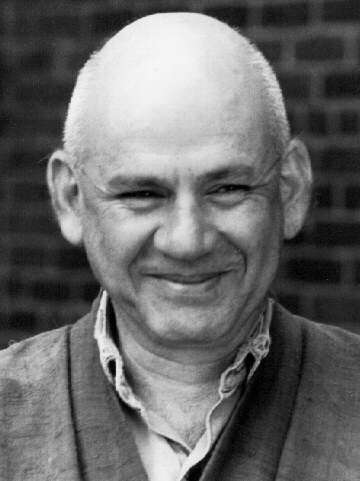Honorary Founding Teacher
Hakuryu Sojun Mel Weitsman Roshi
In Remembrance of Hakuryu Sojun Daiosho
by Hozan Alan Senauke
Our dear teacher Hakuryu Sojun Daiosho (White Dragon / Essence of Purity) Mel Weitsman peacefully passed from this world to the Pure Land of Buddhas and Ancestors at home on Thursday, January 7, 2021. He was ninety-one years old.
Whatever words one can offer here on paper are inadequate to the expression of our loss, and the depth of our gratitude to Sojun Roshi. So, as with any attempt to put Zen into words, we must make a mistake on purpose, and hope that love shines through.
* * *
Sojun Roshi's ordinary, understated, and steady leadership made Berkley Zen Center (BZC) a beacon for Buddhist practitioners and other spiritual seekers in the East Bay and more widely in the U.S. With a strong circle of dedicated Zen students, as guiding teacher and abbot at BZC for fifty-three years, Sojun created a place where rigorous daily sitting practice was integral with people's life of family, work, and service. He often spoke of BZC as a kind of "one room schoolhouse," where each person could find the necessary teachings for their position in life. Anyone could knock on Sojun's office door and he would readily invite them in.
No matter where else he might travel, Berkeley Zen Center was his heart, his body. He knew every brick, every plank, every plant, every stone. Many of them he had placed there himself. Year after year he was with us for zazen, for every meal in the zendo, gardening and painting beside us, sitting through so many early morning meetings. His life was here.
Born in Los Angeles in 1929, Sojun Roshi's broad life experience included a stint in the Marines, years of art study and abstract expressionist painting, augmented by work as a house and boat painter, cab driver, and music teacher. When he met Suzuki Roshi his life work was transformed. He embraced the practice of zazen and the task of sustaining the dharma of Zen given to him by his teacher Shunryu Suzuki Roshi.
At the request of Suzuki Roshi, Sojun founded Berkeley Zen Center in 1967. He was ordained a year later in the attic zendo he had established on Dwight Way in Berkeley.
Suzuki Roshi died in 1971. In 1984, Sojun received dharma transmission from Suzuki Roshi's son, Hoitsu Suzuki Roshi, abbot of Rinso-In Temple in Japan, and he was installed as BZC's first abbot in 1985. In declining health, he stepped down as abbot in October 2020, assuming the position of Founding Dharma Teacher.
From 1988 to 1997, Sojun also served as Co-Abbot of San Francisco Zen Center (where he had begun his Zen practice in 1964), helping to stabilize SFZC through a period of transition while still guiding Berkeley Zen Center. He continued as Senior Dharma Teacher at SFZC until his death. He was also one of the founding teachers of the Soto Zen Buddhist Association and the American Zen Teachers Association.
Sojun Roshi was deeply respected in the Zen community, both in the U.S. and in Japan. His own warm embodiment of Suzuki Roshi's "ordinary mind" was a path of steady and determined practice, the luminous quality of "nothing special." Although Sojun had more than thirty transmitted dharma heirs leading Zen centers around the U.S., and more than two hundred lay ordained Zen students, he was most at home in the community of Berkeley Zen Center, which continues to thrive.
Sojun is survived by his wife Elizabeth Horowitz, their son Daniel, and uncountable disciples and students across the United States and around the world. Cards and letters can be sent to Liz, Daniel, and the BZC sangha c/o Berkeley Zen Center, 1931 Russell Street, Berkeley, CA 94703. When the Covid-19 pandemic abates, BZC and San Francisco Zen Center will collaborate on a formal and widely-inclusive memorial celebration of Sojun Roshi's life and teaching.
The bulk of Sojun's audio lectures can be found at the BZC website. His forthcoming memoir and collection of lectures will be published by Counterpoint Press in 2021, as will a new collection of Suzuki Roshi lectures, edited by Sojun and Jiryu Rutschman-Byler. An additional archive is in process at the Asian Library at Stanford University.
|

